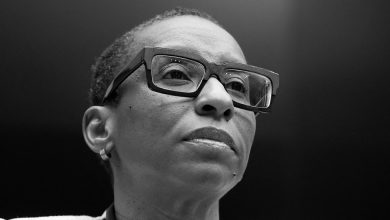No New Money for Jail Officers and Police in $101 Billion N.Y.C. Budget

Mayor Eric Adams and New York’s City Council speaker, Adrienne Adams, said on Friday they had reached agreement on a $101 billion municipal budget that, among other things, excludes Mr. Adams’s proposals to significantly increase staffing levels at the city’s jails and slightly increase the Police Department’s budget.
The spending plan announced by Mr. Adams and Ms. Adams, is the product of a struggle between the first the first-year mayor and the council over how best to confront rising concerns about crime.
Mr. Adams, who won election on a promise to bring down increases in some types of crime that began early in the pandemic, had proposed raising police spending by nearly $200 million dollars — a fraction of the department’s nearly $6 billion budget but a contentious suggestion nonetheless after the protests over discriminatory policing and the murder of George Floyd.
Most of the added money would have gone to contractually obligated raises, overtime pay and a new anti-gun unit. Officials said money could still be found to pay for those items, without providing details.
Ms. Adams, a moderate Democrat like Mr. Adams, leads a City Council that is, collectively, more progressive than her and she has called for more investment in housing and social services as a way of addressing the root causes of crime.
The final police budget is about $60 million below what the mayor initially proposed and about $350 million below what the department got last year, according to the mayor’s office.
In a major concession to the City Council, Mr. Adams dropped his effort to substantially expand Correction Department spending. Although the department does not have a staffing shortfall, chronic absenteeism among correction officers and mismanagement had contributed to what a federal monitor has called chaotic and dangerous conditions at the Rikers Island jail complex.
The mayor originally sought to hire 578 additional officers, a major increase but also a fraction of the figure called for by the Correction Officers’ Benevolent Association, with which Mr. Adams has formed an alliance.
“The council was very vocal about our concern with that,” Ms. Adams said at the boisterous event in the City Hall rotunda where she and the mayor announced the budget deal.
Benny Boscio, the president of the correction officers’ union, criticized the decision in a statement.
“The City Council has now ensured that response times to inmate attacks will grow longer, providing inmates their mandated services will be more difficult and the new system that was going to replace punitive segregation will take even longer to materialize,” he said.
Mr. Adams and Ms. Adams, who share both a surname and a high school alma mater, are not related. But they share politically moderate roots in southeast Queens and, as Ms. Adams noted on Friday, they represent the first all-Black governing team in city history.
The budget agreement arrived uncommonly early in the year, and Mr. Adams argued that it was unusual in other ways, too. It includes an additional $79 million a year for 100,000 summer jobs for young people; $90 million for tax rebates for about 600,000 owners of small properties and $1.5 million for dyslexia-screening for jail detainees (the latter is a pet project for the mayor, who discovered he had dyslexia in college). There is also $22 million to increase litter-basket collections above their prepandemic levels amid concerns that the city’s streets are increasingly filthy.
The agreement, which was reached so early in the year partly because of greater-than-expected revenue from personal income taxes and Wall Street earnings, also puts some $750 million into the city’s rainy day fund.
“We learned from Covid that unexpected things happen,” Mr. Adams said during remarks at the City Hall event.
City budget experts criticized the deal for not setting aside more.
“We think that’s a massive missed opportunity considering how much money they have,” said Andrew Rein, the president of the nonpartisan Citizens Budget Commission. The group had argued that the city should have set aside $2.3 billion — half of the unexpected windfall.
In addition to making crime-fighting a priority, Mr. Adams’s mayoral platform called for improving government efficiency. But his first budget is the largest in city history. Mayor Bill de Blasio’s final adopted budget was $99 billion, and was buoyed by $14 billion in federal pandemic aid. Mr. Rein said the budget announced on Friday was still too reliant on federal aid.
“What we have to remember is that Covid aid ends, it dries up,” Mr. Rein said. “Some of that aid is being used for programs that continue or that they wish to continue.”
Inflation factored into the final budget, with the city having to pay more for energy and “everything that we buy,” according to Jacques Jiha, the budget director. The annual inflation rate for the metropolitan region was 6.3 percent in May, less than the national average, but still high. The last time the region’s inflation rate was higher than it is now was October 1990.
Mr. Adams has struggled so far to calm public fears over crime. Although shootings and homicides are down slightly through the first five months of this year compared with the same period in 2021, they are significantly higher than they were two years ago.
There have also been a number of high-profile shootings, including on the subway in April in which at least 29 people were injured, the fatal random shooting of a subway passenger last month and several instances of children being stuck by, and in at least two cases, killed by stray bullets.
Mr. Adams’s response has been to flood the subways with police officers in a show of “omnipresence,” and to encourage officers to aggressively address so-called quality-of-life offenses by clearing homeless encampments, arresting people for fare evasion and removing unlicensed vendors, who the mayor believes contribute to disorder.
Five months into Mr. Adams’s term, though, crime had increased at least 15 percent in every major category except homicide through June 5 compared with the same period last year, according to Police Department data.
Crystal Hudson, a councilwoman from Brooklyn and a member of the budget negotiating team, said in a statement that by including aid to undocumented immigrant families, restoring cuts to sanitation services and resisting the addition of correction officers, officials had showed that the city could “take steps to break free from a status quo that is woefully unconcerned with the well-being of some of our most vulnerable New Yorkers.”
To commemorate his first budget agreement, Mr. Adams wore a guayabera shirt instead of his typical suit and tie. His budget was relatively conventional, but he said his sartorial choice symbolized his desire to discard traditional approaches to city governance, and he promised more such fashion statements in the future.
“I’m going to stand at this podium some days wearing my Pakistani attire,” he said. “I’m going to stand here wearing my Egyptian attire.”
“I’m going to stand here wearing my A.A.P.I. attire,” he added, referring to clothing favored by those of Asian and Pacific Island heritage. “Folks need to know that this is not a city of just a suit and tie.”
Jonah E. Bromwich, Patrick McGeehan and Ali Watkins contributed reporting.





